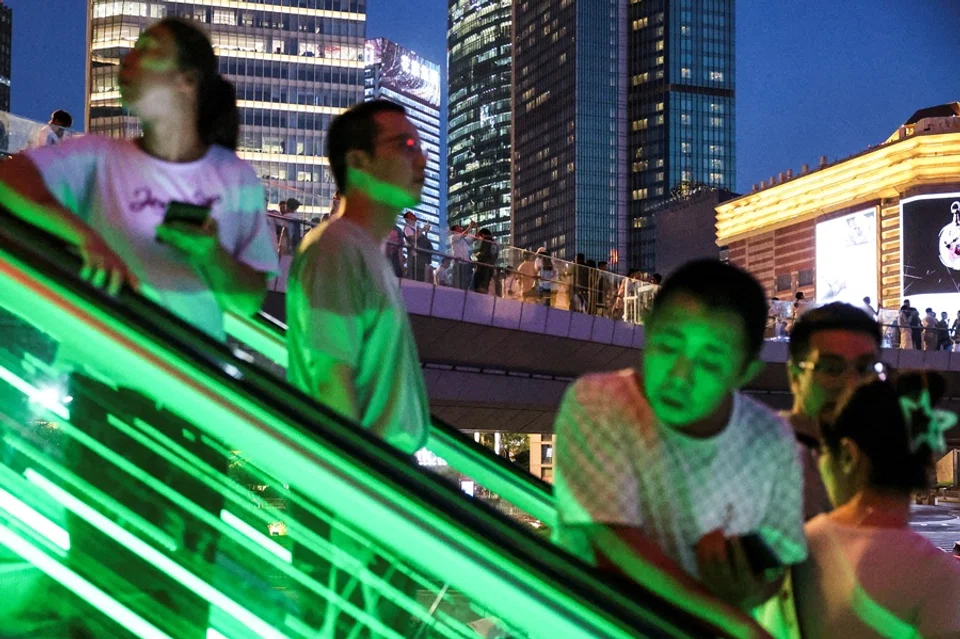Inside the ‘rat nest’: Why young Chinese are choosing to disappear
Amid high pressure and the weakening value of paper qualifications, young people in China are becoming increasingly disillusioned. Some choose to take refuge in their rooms like “rats”, giving rise to the term “rat people”. Lianhe Zaobao correspondent Li Kang speaks to a few of them.

He sleeps at 2 am and wakes up at 10 am, staying in bed scrolling on his phone until lunchtime. After lunch, he takes a nap and wakes up at 5 pm. He scrolls a bit more, and it is time for dinner. After dinner, he watches videos and plays games late into the night…
This has been the typical daily routine of 20-year-old Yin Hao, a university student in Anhui, over the past year. He candidly told Lianhe Zaobao that he is a classic “rat person” (老鼠人) — outside of class, his 1.2-metre-wide dorm bed is his “rat nest”, and the space enclosed by blackout curtains is his little “rat world”.
Over the past few months, this low-energy “rat person” lifestyle has gained traction in China, becoming the latest sang culture (丧文化, youths who are unmotivated and on the brink of depression) phenomenon after “Buddha’s ways” (佛系, learning to live life with Buddhist wisdom), “lying flat” (躺平) and “let it rot” (摆烂, stop trying and just let it be). Originally from Russia, the concept spread to China via short videos and is now used to describe low-desire youths who hole up in rental rooms, live off cheap takeout and keep a topsy-turvy sleep schedule.
“Initially, I only played games occasionally, but I began staying up late more frequently. I slowly adapted to this ‘rodent-like’ rhythm and can’t go back anymore.” — Yin Hao, a university student in Anhui

Amid China’s economic slowdown, soaring youth unemployment and intensifying involution, the term “rat person” has amassed nearly two billion views across the internet, as more and more youths identify with and choose to become “rat people”.
Becoming ‘rat people’
When Yin first entered university in 2023, he was a model student — never missing classes, actively participating in club activities and often spending entire days in the library.
However, as he draws nearer to graduation, Yin, who comes from a small county, feels increasingly overwhelmed. “I neither stand out nor have a good family background. It is extremely difficult for me to succeed through my own effort.”
Influenced by his roommate, Yin became more and more like a “rat person”. He said, “Initially, I only played games occasionally, but I began staying up late more frequently. I slowly adapted to this ‘rodent-like’ rhythm and can’t go back anymore.”
“There’s nothing much to expect from life anyway — it all looks the same ahead. Rather than wandering outside, I’d rather stay home.” — Zhao Yuqing (pseudonym), a 28-year-old office worker in Wuhan
Zhao Yuqing (pseudonym), a 28-year-old office worker in Wuhan, became a “rat person” by conscious choice after much consideration. “There’s nothing much to expect from life anyway — it all looks the same ahead. Rather than wandering outside, I’d rather stay home.”
Zhao is an education company employee on workdays but transforms into a “rat person” on weekends. Whether she leaves the apartment depends on whether she has trash to take out. “If I have trash, I’ll go downstairs to throw it out and buy groceries for two days; if not, I just order takeout for two days and bring the containers out with me on Monday when I go to work.”

When she stays at home over the weekend, Zhao mostly watches shows, plays games or zones out. She only cleans her 58-square-metre rental when it gets so dirty she “can’t take it anymore”.
However, even the simple task of cleaning requires much mental preparation. “If the floor gets to me at noon, I probably won’t start cleaning until four or five in the afternoon.”
Hard work doesn’t always pay off
A sense of hopelessness and helplessness towards reality — the shared reason why both interviewees, nearly a decade apart in age, became “rat people”.
Official data shows that in recent years, the number of Chinese university graduates has soared, with this year’s graduates expected to reach a record 12.22 million, marking the fourth consecutive year above 10 million. Meanwhile, although the urban jobless rate among those aged 16 to 24 — excluding students — fell to a record low of 15.8% in April, the percentage remains significantly high.
“My conclusion is to live in the moment — not saving up and not buying a house. Who knows, there could be a war one day, and the house could be gone just like that.” — Zhao
Although Yin’s engineering major is relatively popular, he is worried about degree devaluation and thus chose to delay employment by pursuing graduate studies. As a liberal arts student and an older single woman, Zhao is more pessimistic about job prospects. “So many graduates can’t find jobs, and so many companies are shutting down. You’re lucky to be just scraping by — how would you dare ask for more?”
Zhao also noted a marked decline in public interest in the college entrance exam (gaokao) this year, which she sees as a growing awareness among the masses that “going to university doesn’t guarantee a good future”. Regarding savings, she is even more unfazed: “My conclusion is to live in the moment — not saving up and not buying a house. Who knows, there could be a war one day, and the house could be gone just like that.”

Nevertheless, Zhao stresses her passion for life, “Although I’m a ‘rat person’, I love life too… My life isn’t abnormal just because I stay home all day.”
Yin has not completely given up on changing his situation either. He occasionally forces himself to go back to the library to reclaim his former discipline. But he admitted that breaking out of the “rat person” comfort zone is extremely challenging: “After just a few days, I feel completely drained. I slip back into my dorm room and turn into a ‘rat’ again.”
“The reality young people face now isn’t something that can be solved by simply ‘snapping out of it’ — they study hard, but still see no future; they work hard, but even the job may disappear... — Tan Gangqiang, Head, Xiehe Psychological Consultation Office, Chongqing
Collective rejection of a high-pressure environment
Tan Gangqiang, head of a psychology consultation centre in Chongqing (重庆市协和心理顾问事务所, Xiehe Psychological Consultation Office), told Lianhe Zaobao that, compared with the earlier “lying flat” phenomenon, today’s “rat people” are feeling a deeper sense of despair.
“Lying flat was mostly about being overworked or underpaid, but at least there was still work and income,” Tan explained. “The reality young people face now isn’t something that can be solved by simply ‘snapping out of it’ — they study hard, but still see no future; they work hard, but even the job may disappear; they try to live seriously, but the quality of life doesn’t improve.”
Chang Chih-chung, dean of the School of Humanities and Social Sciences at Kainan University in Taiwan, concurs. He thinks that youths choose to be “rat people” in response to current economic and social conditions, where the returns on educational investment are disproportionate to the effort; it is also their collective rejection of involution, overtime culture and the high-pressure environment.
Chang observed that this generation’s path to upward mobility through education has slowed significantly. Coupled with a slowing economy, the pressure and sense of defeat they face is far greater than before.

In the Chinese Communist Party’s 20th Party Congress report released in 2022, youths were urged to “aim high but stay grounded, and dare to think big and take action but make sure you can deliver”. They were also encouraged to “strive to be the new era’s great young generation, a generation with ideals, a sense of responsibility, grit, and dedication”. “Rat people” clearly stand in sharp contrast to these official expectations. However, Chang pointed out that the environment young people face today has changed, and they should not be harshly blamed or criticised.
... the term “rat person” allows young people to relieve some stress through self-deprecation. It also helps them find emotional resonance among their peers, which can ease feelings of loneliness and anxiety to some extent. — Tan
He said, “It is actually good that youths are taking a mental break on weekends or seeking comfort and stress relief online among like-minded peers.”
Tan also thinks that the term “rat person” allows young people to relieve some stress through self-deprecation. It also helps them find emotional resonance among their peers, which can ease feelings of loneliness and anxiety to some extent.
Chang added that the situation facing young people is closely tied to whether China’s economy can achieve stable growth again. While today’s youth are more vocal than previous generations in expressing dissatisfaction with the work environment, whether the current situation can truly change still depends on whether the state and businesses can create real opportunities for them.
He said, “The idea of a ‘rat’ reflects its position at the bottom — it can move around freely, but wherever it tries to dig a hole, no one really notices or cares.”
This article was first published in Lianhe Zaobao as “学历贬值前途迷茫 中国年轻一代成为“老鼠人””.

![[Big read] Paying for pleasure: Chinese women indulge in handsome male hosts](https://cassette.sphdigital.com.sg/image/thinkchina/c2cf352c4d2ed7e9531e3525a2bd965a52dc4e85ccc026bc16515baab02389ab)



![[Big read] How UOB’s Wee Ee Cheong masters the long game](https://cassette.sphdigital.com.sg/image/thinkchina/1da0b19a41e4358790304b9f3e83f9596de84096a490ca05b36f58134ae9e8f1)